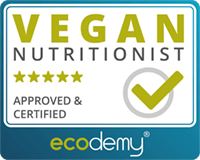Learn about your gut and how a plant-based diet can influence your gut health.
Gut health is particularly important for us humans. Making sure that you maintain a healthy and happy gut will surely benefit your body and mind. A healthy gut is key to maintaining a strong immune function since it prevents viruses and pathogenic bacteria from entering your bloodstream when it works correctly.

Visit activeplantbased for professional help and plant-based nutrition training.
What does your gut do, and why is it important to take good care of our gut bacteria?
Our gut (gastrointestinal tract) is a complex system of organs that includes the stomach and intestines. It is the home to trillions of microorganisms that form a unique ecosystem, your gut microbiome.
Gut bacteria do way more than what we originally might think. They are an essential part of the human body. Because of its significance, you might even call it our second brain. Our gut constitutes a multifunctional network that:
- helps break down and digest food.
- absorbs all nutrients we ingest through food.
- helps to synthesise and balance hormones as well as vitamins.
- is related to our mental health and daily mood.
- helps our body eliminate toxins and waste.
- assists your immune system and protects against some diseases.
Our gut has a way of communicating its needs and what is happening with it
It is made up of millions of neurons, hormones and other cells that help to regulate its functions. This communication system works to identify the body’s needs and ensures they’re met by sending signals to the brain, which then responds to regulate the body’s internal environment.
These signals can include indicators of hunger, fullness, even emotions or pain, and more. For example, a hormone called ghrelin is released when the stomach is empty, and this signal triggers feelings of hunger.
Signs of an unhealthy gut
- experiencing disturbed sleep and constant fatigue
- having an upset stomach, bloating
- indigestion
- constipation
- developing food intolerances or allergies
- bad breath
- having skin irritations
Factors that may affect your gut bacteria
- Diet
Diet is one of the most significant factors that can affect the balance of bacteria in your gut. Eating a wide variety of nutrient-dense foods, probiotics, prebiotics, and fermented foods, can help promote a healthy gut microbiome. On the other hand, eating a diet high in sugar or processed, inflammatory foods can throw off the delicate balance and reduce the diversity of bacteria in your gut. - Method of birth
Whether it is a natural or cesarean delivery, both can affect an individual’s diversity and types of gut bacteria. Cesarean births typically provide less colonisation of beneficial bacteria from the mother, leading to a lower diversity of gut bacteria than that seen in individuals who delivered naturally. - Infant feeding
Infant feeding practices such as breastfeeding, bottle-feeding, and the age at which solid foods are introduced can affect the types and balance of bacteria in a child’s gut. For example, breastfeeding typically provides beneficial bacteria from the mother that can help foster a healthier gut microbiome, while bottle-feeding with formula or cow’s milk can introduce different bacteria into the system. The age at which solid foods are introduced can also affect the diversity of bacteria present in the gut. - Medication
The use of certain medications, including antibiotics and proton-pump inhibitors, can affect the types and balance of bacteria in your gut. For example, antibiotics target both beneficial and harmful bacteria, which can disrupt the delicate balance of bacteria in your gut, while PPIs ( a type of medication used to reduce the production of stomach acid) can reduce stomach acid, thereby reducing the ability of beneficial bacteria to break down food for absorption. - Stress levels and lifestyle
Persistent stress can reduce the number of beneficial bacteria present in the gut. This is because the hormones produced by the body in response to stress can decrease the production of beneficial bacteria while simultaneously increasing the number of harmful bacteria. Certain lifestyle choices, such as smoking and alcohol consumption, can also alter the gut microbiome. Additionally, sudden changes in diet can lead to an imbalance of bacteria in the gut. - Sleep quality and quantity
Chronic poor sleep quality can affect the gut microbiome because it can lead to physiological changes such as hormonal imbalances, increased inflammation, and altered metabolism, all of which can disrupt the delicate balance of bacteria in the gut. Conversely, getting enough rest and following a regular sleep schedule can help to promote a healthy, diverse gut microbiome.
Gut & vegan dieting
As mentioned above, diet is the most crucial factor that shapes our gut’s health. A 2019 study states that a plant-based diet results in the development of more diversified and stable microbial systems.
There is still room for further research that can be done to better define the relationship between diet and gut health.

How to take good care of your gut
1. Fibre is the key to a healthy gut
Dietary fibre is exclusive and almost abundant in a well-balanced plant-based diet and one of the most crucial elements. A lot of people, however, for different reasons, do not consume the desired amount of fibre on a daily basis. When the majority of the food we consume is juices, shakes and highly processed grains, we end up ingesting high levels of sugars (mainly glucose and fructose), which as a result, aggravates our intestinal bacteria.
Fueling your body with enough fibre doesn’t only make your gut happy but also assists in decreasing the risk of developing certain diseases and health conditions.
2. Experiment with herbs and spices
Cumin, ginger, coriander, lemon balm, and cardamon are the best spices for better digestion and gut health.
You can add those to teas, mylk, make your own drinks with them and baked goods.
3. Prebiotic and probiotic supplements
Taking (vegan) prebiotics works as a ‘food’ supplier that helps the good bacteria in your gut grow. Prebiotics, the food that probiotic bacteria feed on, can be found in foods like bananas, oats, onions, garlic, asparagus, and Jerusalem artichokes.
Not all are of good quality, so make sure you do your research before choosing one and perhaps consult a specialist as well.
Factors besides diet that affect your gut health are also: lack of sleep, excessive stress, lack of proper hydration, eating too quickly etc.
Vegan foods good for your gut
(all in moderation)
- Apple cider vinegar helps your body create hydrochloric acid, which helps break down carbs, fats and proteins. Just use it in a salad the next time.
- Mangos help keep the good bacteria alive in your gut. Bonus points for eating when it is mango season.
- Sprouted grains and their products produce enzymes that also help break down macronutrients.
- Coconut oil helps restore your gut’s bacteria and kill harmful ones.
- Raw garlic and onions are high in prebiotics that helps feed and fuel healthy gut bacteria.
- Food that is high in fibre, such as bananas, oats and blueberries.
- Carrots, broccoli, and oranges also help.
- Fermented foods like kimchi, tofu, pickled veggies, and miso.
- And walnuts.

